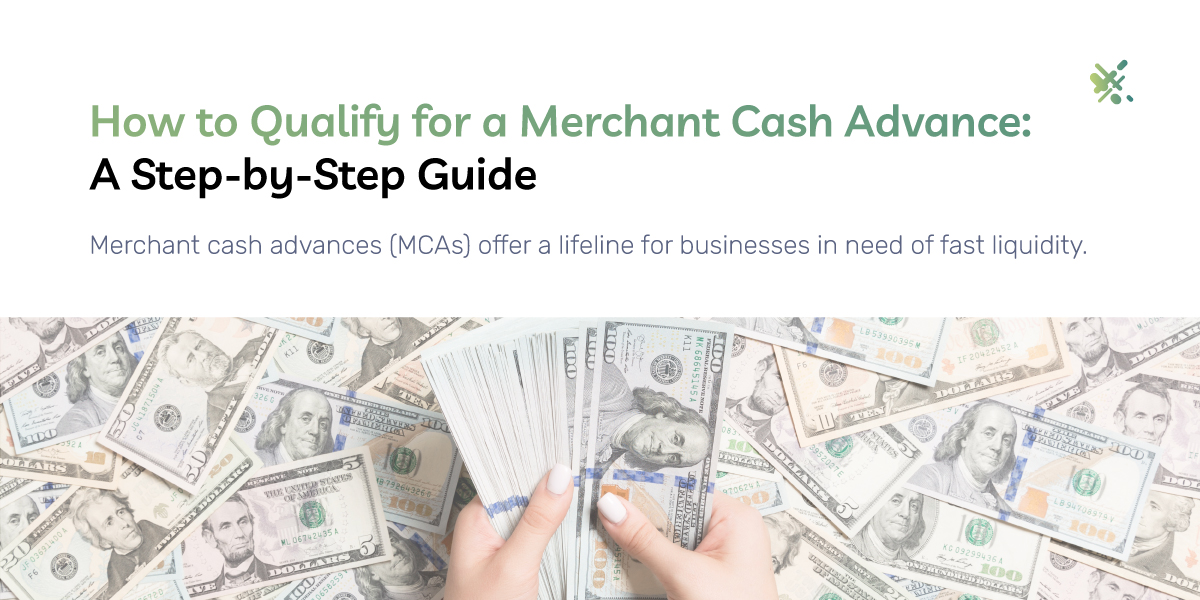If you’re reading this you’re probably on the hunt for some funds. Well, this is where a merchant cash advance may help your business.
Whether you’re a new or established business, it’s not uncommon to need fast liquidity from time to time. Cash flow is the lifeblood of any business, and finding a solution to cash flow problems can sometimes mean the difference between a successful and a struggling business.
The problem is that traditional small business loans and lines of credit can be challenging to qualify for. This is especially true for those with less-than-perfect credit or limited financial history.
Merchant cash advances (MCA) are an alternative to these traditional forms of lending. An MCA can provide instant liquidity for your business and give you the cash you need to capitalize on business opportunities as they present themselves.
This article will review what you need to qualify for a merchant cash advance. We’ll also cover the application process so you can be prepared and understand the pros and cons of an MCA compared to traditional lenders.
Qualifying For MCAs
Merchant cash advances are available to merchants who may not qualify for small business loans, equipment loans, or business lines of credit. In general, MCAs have an acceptance rate of approximately 90%. So, business eligibility for MCAs is higher than that of other traditional forms of lending.
Below, we’ll cover merchant cash advance requirements contributing to the MCA approval process.

Length of Time In Business
Most MCA providers will require you to be in business and operating legally for at least one year. Some providers may offer smaller MCAs to those in business for less than a year, but this type of arrangement is less common.
A merchant cash advance works by using historical sales volumes to judge lending risk. Without sufficient time in business, this judgment is too difficult. Typically, the absolute cut-off is six months. But in these cases, you will need to meet higher criteria, which we’ll discuss later.
Overall, if you’ve been in business for one year, you will meet the criteria for most MCA providers and be able to move forward with the application process.
History Of Merchant Account Payment Processing
Most MCAs will use automatic deductions from credit and debit card sales to pay back the MCA amount you owe. These deductions are made daily and are a percentage of your daily credit card sales. This means you will need a merchant account processing history to show your daily average transactions.
You should be able to show at least six months of payment processing statements that show a stable average of your daily transactions.
In rare cases, businesses that do most transactions in cash or by other means can still qualify for an MCA, but there may be additional requirements. In these cases, the MCA provider will make fixed withdrawals from your business bank account.
Credit Score And MCAs
Your credit score is not a primary criterion for an MCA since the payback is based on your business’s revenue, and deductions are automatic. However, an MCA provider will often consider your credit score. For most MCAs, you will want to have a minimum credit score of 550.
Sometimes, a credit score as low as 500 will still qualify if your other criteria are strong and show a high likelihood of paying back the MCA amount. Most credit checks by MCA providers are “soft pulls,” meaning they won’t harm your credit. But you should always ask before submitting a credit check, especially when shopping between different MCA providers.
Strong, consistent monthly revenue over a long period of time is generally a more important criterion than your credit.
Business Revenue For MCA Eligibility
Approximately $15K per month is the average amount that most MCA providers will require when it comes to your revenue required to qualify for an MCA. Just understand that some providers may go as low as $10k per month and some may require $25k-$50K a month or more.
In most situations, monthly revenue between $15K and 25K should allow you to qualify with a majority of MCA providers. The lower your sales, the lower the MCA funding limits.
Overall, your monthly revenue is the most important criterion for determining your loan terms. Since no collateral is required for an MCA, your monthly revenue is the primary source of repayment.
6 Months of Financial Statements
Small business owners must submit their financial statements for an MCA application. In most cases, MCA providers require six months of bank statements or similar documents.
These will include your business’s balance sheet, income statement, and cash flow statement. Some MCA providers may also require additional documents.
You can produce these documents from your accounting software or contact your accountant or bookkeeping service.
Not Currently Under Another Merchant Cash Advance
You can’t currently be enrolled with another MCA agreement and then apply for an additional MCA. If you’ve already contracted with an MCA and need additional funding, you need to contact your original provider to try to negotiate new terms through them.
No Defaults On Other Loans
You will likely not qualify for an MCA if you have already defaulted on previous loans or funding services. However, you can have additional debt as long as it’s up to date and you are compliant with all repayment terms. Your debt ratio may play into how much you qualify for in certain circumstances.


Merchant Cash Advance Application Process: Documentation
Once you’ve determined that you meet the minimum requirements for an MCA as outlined above, you can move on to the application process. The application for an MCA moves quickly compared to a traditional loan, taking about 15 minutes to complete, assuming you have all the necessary information available.
The application process may also be divided into two separate steps. The first is when you submit basic information, such as the loan amount you want and your current processing volumes. After that, the second phase will require you to submit documentation.
From there, the approval decision is fast and can sometimes be done the same day or the next business day. Many merchant cash advance companies use online applications to speed up the process over traditional bank loans.
To help with you document prepare for MCAs, we’ll cover what you need and offer tips for speedy MCA approval.
Amount Of Loan
Before applying, you’ll want to determine how much money you need to borrow. This may seem obvious, but it’s not uncommon for merchants to not have an exact figure before applying. Make sure to include the cost of the loan and any deductions or fees that will be taken out before you receive your money. Before receiving it, lenders generally deduct origination or underwriting fees from your loan amount.
Business Information
Before applying, have all of your business information ready. This includes your company name, registrations, EIN, articles of incorporation, and other similar documents.
You will need to provide not only your business information but also your personal information. For partnerships or LLCs, other members may also need to provide their information.
Bank Statements or Bank Access
Your MCA provider will likely want access to bank statements to confirm your cash flow and monthly deposits. They may require hard copies, although much of this can be done through third-party bank verification services today. You’ll need your online banking credentials to allow the third-party service to request your banking information.
Business Tax Returns
Some MCA providers will want to see your most recent business tax returns to confirm certain information.
Business Financial Statements For MCAs
Typically, MCA providers require common financial statements like your business’s balance sheet and cash flow statement. The requirements can vary and will depend on how much other documentation you have available.
Business & Personal Credit Reports
You will want to research your business and personal credit before applying. This way, you’ll know your score and what the MCA provider is seeing.
If you don’t use a business credit card or business loans, you may not have a business credit score. If so, the MCA provider will look at your personal credit score.
Just be aware that credit isn’t a major deciding factor, but there is a minimum requirement that you’ll need to meet in most cases.
Credit Card Processing Statements
This is the documentation that your MCA provider will be most interested in. The MCA provider will want to see your last six months to one year of processing statements.
Most merchant accounts deliver these digitally, so you’ll likely have to access them via your merchant account dashboard. If you are having issues finding these statements, you can contact your payment processor for help when reviewing your credit card transaction criteria.

MCA Application Tips
The application and requirements for a merchant cash advance are relatively straightforward. However, some tips and best practices will help ensure the process goes smoothly and you get the best deal possible.
Do Your Research
Research is essential when making any business or financial decision, and a merchant cash advance is no different.
There are many providers now for MCAs, and they can all offer different costs, fees, and amounts that they are willing to lend you. Understanding MCA terms is crucial to determining whether the loan makes sense for your business.
Since applying for an MCA is easy, you may be tempted to accept the first offer or deal with the first company you interact with. So, before you even start applying, research a few MCA providers and try to understand their requirements and fee structures.
A few things to look out for are fee structures that are not transparent or if the MCA provider glosses over the fees. A reputable MCA provider should clearly explain the fees and maintain transparency regarding the calculation of fees.
Another thing to watch out for is MCA providers with requirements that seem too low or too good to be true. For example, a low monthly revenue threshold is sometimes the sign of a predatory lender.
MCAs escape traditional financial lending laws and guidelines because they are not technically classified as loans. This means you must do your due diligence when researching MCA providers before applying and signing the contract.
Prepare Your Loan Amount
Base the loan amount you request on your business’s specific need or goal. For example, if you need to purchase seasonal inventory at a discount, that’s a particular need. Requesting a general amount to maintain business operations is not the best use of an MCA or the best way to determine your funding amount.
Carefully examine your needs for the funds and how much you need. This will help ensure you profit from your MCA and that you don’t borrow too much or too little. Because of the high cost of MCAs, you don’t want to borrow more than you need.
Compare Your Lending Options
An MCA can be a great financial tool when used correctly. But it’s not right for every situation. Look closely at your financial needs and compare an MCA to your other lending options.
Most merchants choose an MCA because of the fast application process and lower credit requirements. But if you can obtain the same amount of cash through a lower-cost option, you should also consider that.
Compare the two options and the total cost of borrowing the funds. Also, look at how the repayment will impact your business operations and cash flow. After careful analysis, if an MCA is the right choice, you can move forward with confidence, knowing it’s the best fit for your current situation.
Negotiating With MCA Providers
You can negotiate certain aspects of an MCA to tailor it to your situation. Specific fees, the length of the loan, and a few factors are sometimes negotiable. If an aspect of an MCA doesn’t feel right, don’t hesitate to ask for slightly better terms to make it a better fit.
Understand Any Business Restrictions Within The MCA Contract
Regarding the funds, there are few restrictions on how you can use your MCA. However, some MCA contracts may restrict how you conduct business. For example, most MCA providers will prohibit you from promoting cash use over credit cards.
Another restriction is the inability to switch merchant account providers or payment processors during the MCA. This prevents merchants from circumventing their responsibility and ability to pay back the MCA. These restrictions are necessary to protect the MCA provider, but they are something you want to consider.
Be Honest About Your Business Prospects
Merchant cash advances are designed for businesses with strong revenue and a proven business model. They aim to get quick cash so you can take advantage of a business opportunity or scale your successful business quickly.
A struggling business with waning sales or an outdated, non-growing business model is unsuitable for an MCA. In these cases, you need to be honest and restructure the business first. Taking on more debt for a struggling business will likely just make your financial situation worse.
However, if your financial issue is temporary, an MCA is still a viable option. But just make sure to be honest with yourself and your business prospects before entering into an MCA contract. An MCA should help you boost revenue and, in the end, be profitable.

Prepare For A Merchant Cash Advance
It’s possible you don’t need a merchant cash advance right now, but you may want to use one in the future. If so, there are things you can do now to prepare your finances. This can help you get the best rates when you apply for an MCA.
Don’t Run Negative Balances
Do whatever it takes to ensure you have no negative balance periods on your bank statements. Even just a day of negative balance, as you wait for the check to clear, can be a warning sign to MCA providers.
High Daily Balances
This is similar to the previous point. You want to ensure your daily balance in your accounts is as high as possible. Low daily balance averages are another warning sign that can prevent you from getting an MCA or force you to pay higher rates.
Build Your Credit Score
If you’re on the edge of a bad credit score, you can start improving it right now to give yourself an edge when you need an MCA. Not only that, but it will help with all your other borrowing as well. Enhancing your MCA application with a higher credit score can lower your overall cast for the loan.
Preparing For MCA Repayments – Daily Sales and MCAs
While the fast funding for businesses is attractive, prepare for how you will budget the daily deductions so it doesn’t negatively impact your ongoing operations. The MCA funding cycle initiates repayments on the same day or the day after disbursing the loan.
As long as you follow these guidelines and perform your due diligence and research, an MCA can be a valuable tool for small businesses that need fast financing.
Frequently Asked Questions About How to Qualify for a Merchant Cash Advance
For a business to qualify for a merchant cash advance, it should be in operation for at least one year, have a history of payment processing statements, have monthly revenue of over $15,000, and the owner should have a credit score of at least 550.
For your MCA application, you will need to provide your business’s credit card processing statements, company name, registrations, EIN, articles of incorporation, bank statements, business tax returns, business financial statements, and possibly your credit reports.
Compared to traditional loans, the MCA application process is relatively quick, taking about 15 minutes to complete, assuming you have all the necessary information available. The approval decision may be made within 24 business hours.
To improve your chances of approval for a merchant cash advance, avoid negative balance periods on your bank statements and keep your daily account balance as high as possible. Although MCAs don’t care about credit scores as much as they do processing amounts, be sure to continually work to improve your credit.
